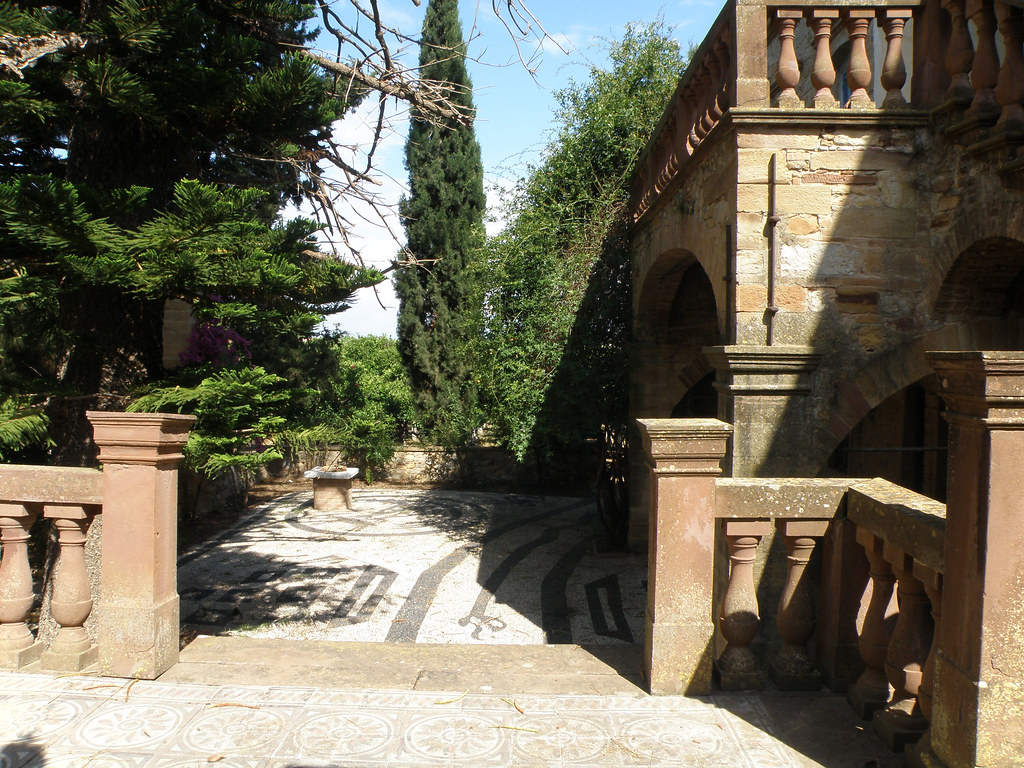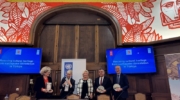European experts deliver report for the rehabilitation of the Kampos of Chios, Greece
Europa Nostra, the leading heritage organisation in Europe, and the European Investment Bank Institute made public on 15 March 2017 a technical and financial report for the rehabilitation of the Kampos of Chios in Greece, listed among The 7 Most Endangered heritage sites in Europe in 2016, following a nomination by Elliniki Etairia ‐ Society for the Environment and Cultural Heritage. The European experts propose the establishment of a new executive organisation responsible for the sustainable development of the Kampos and recommend several short and medium term actions which need to be taken.
The Kampos of Chios is a semi-urban, semi-rural area where the islands’ wealthier families built beautiful mansions of local stone, surrounded by citrus orchard estates. The 200 houses and towers which survive, combined with high stone walls separating the estates and narrow surrounding lanes, create a poetic landscape.
The sole surviving example of an originally Genoese colonial order – although frequently rebuilt since the 14th century as a result of earthquakes – the Kampos is seriously endangered. Despite two official preservation decrees however, protection has proven inadequate. Meanwhile the replacement of citrus with the thirstier cultivation of potatoes and vegetables has led to serious problems of water quality and quantity. Other threats are also increasing: through traffic and the partial demolition of stone boundary walls.
“It is recommended that the current ad-hoc organisational structure is formalised into a single representative body, or at least a structured umbrella organisation. That body needs to be perceived by all those with an interest in the Kampos, and all branches and levels of government, as representing the best interests of the Kampos: its people, its stakeholders, its history, and the physical and cultural heritage of the place. The organisation would be a single point of contact between Kampos stakeholders and all branches and levels of the public administration,” states the report prepared by Campbell Thomson, Technical Consultant appointed by the European Investment Bank Institute, in collaboration with various national and European experts.
“A key role of this organisation would be to oversee the staff and resources of a new executive organisation to be established: the OAAK – Organisation for the Sustainable Development of Kampos. At present, the public services on Chios have neither the resources nor the breadth and depth of advisory services which will be required to support the redevelopment of what is both a cultural heritage site and an economic development project. However, if the proposed legislation were to be approved, the Municipality would have the legal authority to play a more active role in the regeneration of Kampos, in concert and complementarity with the proposed OAAK,” notes the experts’ report.
According to the report, the short and medium term actions which need to be carried out are:
1) there should be an immediate moratorium on the construction of new houses and other buildings within the Protected Historic Monument area;
2) the public rights of way, water courses and walls within the historic area should be recognised as being subject to the same historic protection as the rest of the built environment. This should include the recognition that it would be more appropriate for the current road running to the west of the area to be classed as the National Road, rather than the road through the very centre of the protected area;
3) the government should be lobbied, not only to sell on the estates which it currently owns, but specifically to give a long lease at nominal rent to an appropriate development organisation, e.g. the suggested OAAK, to establish it as a working museum, resource centre and demonstrator;
4) water rights should not be classed as a free good. All water extraction should be controlled and licensed;
5) the Kampos should be established as an economic development area;
6) a legal framework should be established to enable the Municipality to intervene efficiently in the protection of properties which are abandoned, empty or of unknown ownership; and
7) the taxation of the Kampos estates should be readjusted, to be based on their “commercial value” as agricultural land.
The rehabilitation project of the Kampos of Chios would require 30 million euros, plus any grant support which might be provided to owners of important buildings in need of restoration and repair.
The technical and financial report plan was formulated on the basis of the outcomes of a three-day mission in Chios in September 2016, during which delegates from Europa Nostra, the European Investment Bank Institute and Elliniki Etairia visited several estates in the Kampos and discussed the situation with representatives from the local authorities and with NGOs already actively involved in the area. The team was comprised of Costa Carras, Vice-President of Europa Nostra, Campbell Thomson, Ioanna Steriotou, Member of the Scientific Council of Europa Nostra, and various representatives from Elliniki Etairia, namely P. Kremezis, C. Koutsadelis and N. Triantafyllopoulos.
Following expert missions to other sites listed among The 7 Most Endangered 2016, Europa Nostra and the European Investment Bank Institute will present technical and financial action plans for the Archaeological site of Ererouyk and the village of Ani Pemza in Armenia and Helsinki-Malmi Airport in Finland in the coming weeks. The reports for Patarei Sea Fort in Tallinn in Estonia and Colbert Swing Bridge in Dieppe in France were published in December 2016 and February 2017 respectivly. Working meetings related to the Convent of St. Anthony of Padua in Extremadura in Spain and the Ancient city of Hasankeyf and its surroundings in Turkey will be held in the coming months.







